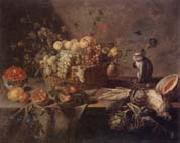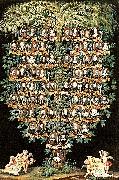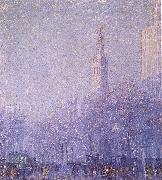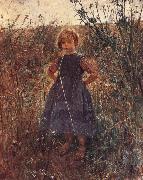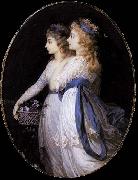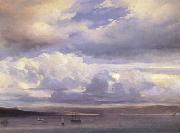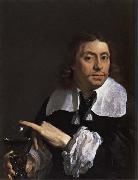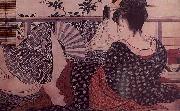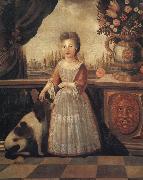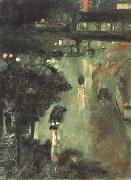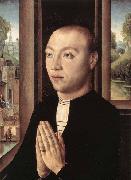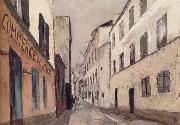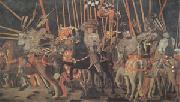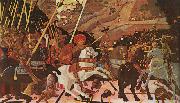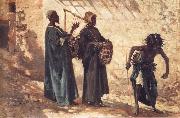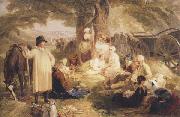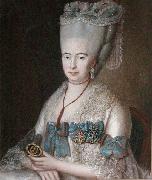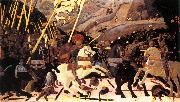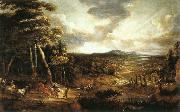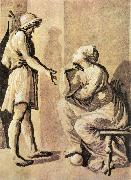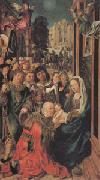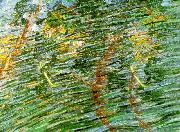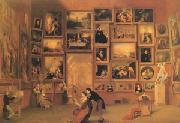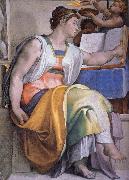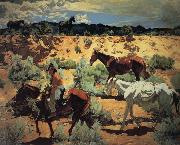|
|
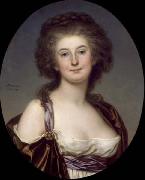 |
Adolf Ulrik Wertmuller
|
|
(February 18, 1751 e October 5, 1811) was a Swedish painter whose notable works include Danaë receiving Jupiter in a Shower of Gold.
Wertmeller was born in Stockholm and studied art at home before moving to Paris in 1772 to study under his cousin Alexander Roslin and French painter Joseph-Marie Vien. On July 30, 1784, Wertmeller was elected to the Royal Academy of Painting and Sculpture.
Wertmeller was commissioned by Gustav III of Sweden for a portrait of Marie Antoinette, which is now in the Nationalmuseum at Stockholm. In 1787, he produced his masterpiece Danaë, a work which proved controversial as one of the earliest female nude paintings exhibited in America.
Wertmeller first emigrated to the United States in May 1794 and continued his portrait work, most notably of General George Washington, but in 1796 was called back to Sweden, eventually returning to Philadelphia in 1800. Elizabeth B. Johnston, in her book Original Portraits of Washington (Boston, 1882), speaks of five portraits of Washington by Wertmeller, of which one, executed in 1797, was purchased by the U. S. government in 1878, and another is owned by the Historical Society of Pennsylvania.
Wertmeller was married to Elizabeth Henderson, granddaughter of noted early American painter Gustavus Hesselius, on January 8, 1801, and two years later retired to a plantation in Claymont, Delaware, where he lived the final years of his life. He died near Marcus Hook, Pennsylvania, aged 60.
|
|
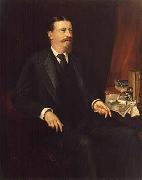 |
Adolfo Muller-Ury
|
|
(March 29, 1862 - July 6, 1947) was a Swiss-born American portrait painter and impressionistic painter of roses and still life.
He was born Felice Adolfo Meller on March 29, 1862 at Airolo, in the Ticino in Switzerland, into a prominent patrician family whose lineage descended from Alfred the Great, Charlemagne and Doge Pietro Orseolo of Venice, through the von Rechburg family (a lady from which family married a Meller) and by the 18th and 19th centuries included mercenaries, lawyers, hoteliers and businessmen. His father was lawyer Carl Alois Meller (1825 - 1887), Gerichtspräsident (Presiding Judge) of the Cantonal Courts, and his mother Genovefa Lombardi (1836 - 1920), daughter of Felice Lombardi who was Director of the Hospice on the St Gotthard Pass, which he took over from the Capuchin monks who had run this for centuries. Adolfo was their sixth of nineteen children, most of whom survived infancy. The family spoke Airolese mainly, a local dialect of Ticinese Italian, as well as Swiss-German. His family were Roman Catholic.
|
|
|
|
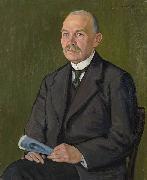 |
Aleksander Uurits
|
|
(May 12, 1888 - August 10, 1918) was an Estonian painter and graphic artist.
|
|
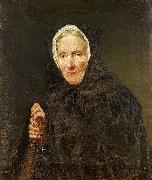 |
Carl d Unker
|
|
(3 February 1828 - 23 June 1866)was a Swedish artist. He was mostly known as a socially oriented genre painter whose works were contemporary subjects of his time, like waiting rooms at railway stations, and scenes from pawnshops for example.
D'Unkers father was a Norwegian military, his mother Swedish. He began his career as a military and had served at the Svea Life Guards for a short time, when he in 1848 volunteered in the First Schleswig War 1848-1849. Shortly after his return to Sweden he abandoned his military path and went to the arts. He moved to Desseldorf to study painting, there he got married to a wealthy Russian woman and could live a carefree life financially. He became a very popular artist on the continent. From 1861 he suffered from sickness in his right arm so he had to paint with his left arm. He made a brief visit to Sweden in 1865, and was appointed professor by Swedish king Charles XV. The following year he died. |
|
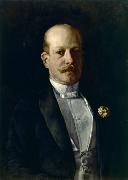 |
Charles Frederic Ulrich
|
|
Charles Frederic Ulrich (1858, New York City - 1908, Berlin), was an American painter.
According to the RKD he worked in the Netherlands ca. 1890. He attended the Royal Academy in Munich, Germany, as did William Merritt Chase, who like him, was influenced by Dutch Golden Age painting and who has been documented as painting his portrait. He was discovered by Thomas B. Clarke, a lace and linen manufacturer in New York who became a collector of contemporary American art. Ulrich painted his portrait in gratitude after his painting "In the Land of Promise, Castle Garden" was shown at the National Academy of Design, where it won the National Academy's first Thomas B. Clarke Prize for Best American Figure Composition. |
|
|
|
|
|
|
|
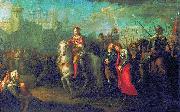 |
Grigoriy Ugryumov
|
|
painted Alexander Nevsky in Pskov, after they victory over the Germans in 1793. |
|
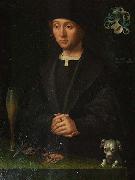 |
Jacob Claesz van Utrecht
|
|
also named by his signature Jacobus Traiectensis (born c. 1479 - dead after 1525) was a Flemish early Renaissance painter who worked in Antwerp and Lebeck.
Jacob van Utrecht's life is still very much in the dark. Research on this important Flemish artist did not start before the end of 19th century. He was probably born in Utrecht, although it is not certain. It is assumed that he became a citizen of Antwerp around 1500 and he is recorded as a "free master craftsman" of the Guild of St Luke there from 1506 to 1512.
From 1519 to 1525 he is recorded as a member of the Leonardsbruderschaft ("Leonard's Brotherhood"), a religious confraternity of merchants in Lebeck among whose ranks the leaders of the Protestant Reformation in the 1530s could be found.
From then on no traces of his life have been found.
|
|
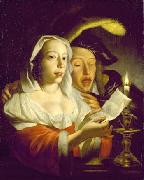 |
Jan Vermeer van Utrecht
|
|
(bapt. 16 February 1630, Schipluiden - c. 1696, Vreeswijk), was a Dutch Golden Age painter. Though he was born near Delft, there is no known relation between this painter and Johannes Vermeer.
His father died when he was 10 and he was raised by his step-grandfather in Rotterdam. According to Houbraken he travelled to Italy with Lieve Verschuier and became friends with Willem Drost and Johann Carl Loth.
He returned North in 1662, where he became member of the Utrecht Guild of St. Luke in 1663 and became deacon of the guild 1664-1666.Houbraken tells a curious story about Vermeer van Utrecht in his biography of Jan Davidsz de Heem. In this story, on his return from Italy, Vermeer marries a widow who owns a white lead factory. He is wealthy and has a carefree life until his wife dies and then his factory is burned by French soldiers. He manages to save a garland painting by De Heem that he once paid 2000 guilders for. This was an enormous sum of money, but Houbraken mentions that his grandfather had been a wealthy man, and until his factory was destroyed, Vermeer van Utrecht had been painting for pleasure, rather than professionally. The amount is meant as an indication of the fame and esteem of De Heem, rather than the wealth of Vermeer van Utrecht. Vermeer van Utrecht then applies to his benefactor, Frederick Nassau de Zuylestein, to give him a government post in return for this painting, which he offers to paint with the likeness of the young prince Willem III in the middle of the garland. The lord of Zuylestein was the governor of the young prince from 1659 to 1666, so this deal must have been done sometime between 1662 (Vermeer van Utrecht's return from Italy), and 1672 (the death of the lord of Zuylestein). Apparently, the deal is done, and several years pass, in which Vermeer van Utrecht did become an appointed member of the Utrecht regency (Vroedschap), but where he felt like a fifth wheel. In 1672 the Utrecht council takes pity on him, and gave him the post of Toll-collector and controller of the river lock at Vreeswijk, where he later remarried. |
|
|
|
|
|
|
|
|
|
|
|
|
|
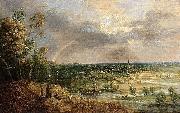 |
Lucas van Uden
|
|
(18 October 1595 - 4 November 1672) was a Flemish Baroque painter specializing in landscapes.
Lucas van Uden was born in Antwerp, where he entered the guild of St. Luke in 1626-27. Although he was never part of Peter Paul Rubens's studio, his works are partly indebted to that master. Van Uden even made copies of Rubens's works on several occasions. His technique, however, owes as much to earlier painters like Joos de Momper and Jan Brueghel the Elder. General characteristics are a tonally-green recessive view punctuated by slender trees and populated by incidental pastoral and peasant figures. Many of Van Uden's figures were either copied from Rubens or painted by David Teniers the Younger. He is often associated with fellow landscape painter Jan Wildens.
|
|
|
|
|
|
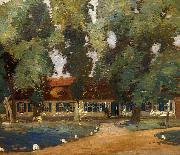 |
Max Uth
|
|
painted Landsitz in der Mark in 1900 |
|
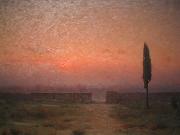 |
Modest Urgell
|
|
Modest Urgell (1839-1919) was a Spanish Catalan painter, illustrator, and playwright of comedies. He was educated at the Llotja School, in Barcelona, with Ramon Marte i Alsina and knew Gustave Courbet after a visit to Paris. Though he painted portraits, his prolific body of work is dominated by Neo-romantic landscapes, such as Fields of Loneliness (Campos de Soledad) (1894). He also acted and wrote such works for the theatre as Far from the Eyes, Close to the Heart (Lejos de los Ojos, Cerca del Corazon) (1898).
In 1910 he taught at the School of Industrial and Fine Arts in Barcelona. Whilst he was there he worked with Josep Pasce and he taught the young Joan Miro. |
|
|
|
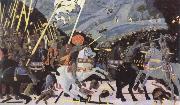 |
paolo uccello
|
|
(b Florence, c. 1397; d Florence, 10 Dec 1475). Italian painter, draughtsman, mosaicist and designer of stained glass. His work vividly illustrates the principal issues of Florentine art during the first half of the 15th century. Trained within the tradition of the Late Gothic style, he eventually became a leading exponent of the application of linear perspective based on the mathematical system established by Filippo Brunelleschi and Leon Battista Alberti. It is the merging of these two diametrically opposed tendencies that forms the basis of Uccello's style. As well as painting on panel and in fresco (many of his works in this medium have been severely damaged), he was also a master mosaicist and produced designs for stained glass.
|
|
|
|
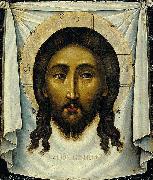 |
Simon Ushakov
|
|
1626 - 1686) was a leading Russian graphic artist of the late 17th-century. Together with Fyodor Zubov and Fyodor Rozhnov, he is associated with the comprehensive reform of the Russian Orthodox Church undertaken by Patriarch Nikon.
We know almost nothing about the early years of Simon Ushakov. His birth date is deduced from his inscription on one of the icons: In the year 7166 painted this icon Simon Ushakov son, being 32 years of age.
At 22 he became a paid artist of the Silver Chamber, affiliated with the Armory Prikaz. The bright, fresh colours and exquisite, curving lines of his proto-baroque icons caught the eye of Patriarch Nikon, who introduced Simon to the tsar Alexei Mikhailovich. He became a great favourite with the royal family and was eventually (1664) assigned to the Kremlin Armoury, run by an educated boyar Bogdan Khitrovo. |
|
|
|
|
|
|
|
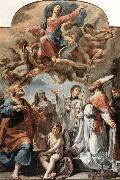 |
Ubaldo Gandolfi
|
|
Italian Painter, San Matteo della Decima, 1728 - Ravenna, 1781 |
|
|
|
|
|
|
|
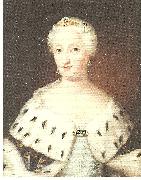 |
ulrica fredrica pasch
|
|
Ulrika Fredrika Pasch, född 10 juli 1735 i Stockholm, död 2 april 1796, var en svensk konstnär. Hon var dotter till konstnären Lorens Pasch d.ä. och Anna Helena Beckamn, syster till konstnären Lorens Pasch d.y. och brorsdotter till konstnären Johan Pasch.
Ulrika Pasch började måla 1756 men hade tidigt tillsammans med sin bror fått undervisning av fadern. Hon blev hushållerska åt en släkting, men målade på fritiden. Under en tioårsperiod försörjde hon sin pappa och syster som professionell porträttmålare i Stockholm innan hennes bror återvände från sina studier utomlands 1766, då de började arbeta tillsammans. Deras samarbete beskrivs som harmoniskt och de valdes båda in i konstakademien 1773. Hon var inte den första kvinnan som valdes in i akademin, men hon var den första kvinnliga yrkeskonstnären som blev vald. Hon ska ha målat detaljerna på broderns tavlor, som klädesdetaljer och liknande. Ulrika hade en framgångsrik karriär och målade ofta porträtt av kungafamiljen och hovet. Hon ansökte dock upprepade gånger förgäves för en pension. Systern Helena Lovisa (1744-96) hushållade åt sina syskon.
Trots att det sägs att hon själv var en ödmjuk person som aldrig framhävde sitt arbete, så är hon en av få kända självförsörjande kvinnliga yrkeskonstnärer i Skandinavien före artonhundratalet. |
|
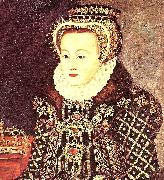 |
ulrica pasch
|
|
Ulrika Pasch började måla 1756 men hade tidigt tillsammans med sin bror fått undervisning av fadern. Hon blev hushållerska åt en släkting, men målade på fritiden. Under en tioårsperiod försörjde hon sin pappa och syster som professionell porträttmålare i Stockholm innan hennes bror återvände från sina studier utomlands 1766, då de började arbeta tillsammans. Deras samarbete beskrivs som harmoniskt och de valdes båda in i konstakademien 1773. Hon var inte den första kvinnan som valdes in i akademin, men hon var den första kvinnliga yrkeskonstnären som blev vald. Hon ska ha målat detaljerna på broderns tavlor, som klädesdetaljer och liknande. Ulrika hade en framgångsrik karriär och målade ofta porträtt av kungafamiljen och hovet. Hon ansökte dock upprepade gånger förgäves för en pension. Systern Helena Lovisa (1744-96) hushållade åt sina syskon.
Trots att det sägs att hon själv var en ödmjuk person som aldrig framhävde sitt arbete, så är hon en av få kända självförsörjande kvinnliga yrkeskonstnärer i Skandinavien före artonhundratalet. |
|
|
|
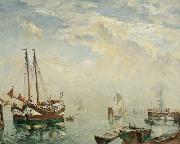 |
Ulrich Hubner
|
|
(17 June 1872 Berlin - 29 April 1932 Neubabelsberg) was a German painter.
He was born into a family of artists, his academic training he received in 1892 in Karlsruhe with Robert Poetzelberger, Gustav Schönleber, and Carlos Grethe. He then studied at the private art school in Munich Friedrich Fehr. In 1899, he was a member of the Berlin Secession, and in 1906 and 1907 was on the board.
In 1899, he won the prize for advertising designs for cooperative advertising by Ludwig and Otto Stollwerck Henkell.
He painted in Berlin, Havel, and in the summers in Hamburg, Lebeck, Rostock and Travemende (where he had his principal residence from 1909 to 1912), and in particular, many harbor scenes.
He showed at Kunstverein in Hamburg in 1910. Some of his works are in the Behnhaus Museum, in Lebeck, and Los Angeles County Museum of Art.
|
|
 |
ulrika eleonora
|
|
Ulrika Eleonora d.y., född 23 januari 1688, död 24 november 1741, var regerande drottning av Sverige 1719-1720, dotter till Karl XI och Ulrika Eleonora av Danmark, syster till Karl XII samt kusin till August den starke, Fredrik IV av Danmark och Fredrik IV av Holstein-Gottorp.
Hon gifte sig 24 mars 1715 med Fredrik av Hessen, den blivande Fredrik I, men förblev barnlös.
Ulrika Eleonora föddes den 23 januari 1688 på Stockholms slott som dotter till kung Karl XI och Ulrika Eleonora d.ä. Under barndomen förbisågs hon av alla för sin äldre, livligare och mera begåvade syster Hedvig Sofia.
Så snart hon blivit giftasvuxen fick hon många friare, bland andra blivande Georg II av Storbritannien och arvprins Fredrik av Hessen-Kassel. Redan 1710 begärde denne hennes hand, men deras trolovning tillkännagavs inte förrän den 23 januari 1714. Bilägret firades den 24 mars 1715.
Under Karl XII:s vistelse utomlands var hon, efter Hedvig Sofias död (1708), den enda myndiga medlemmen av kungahuset inom riket om man borträknar hennes åldriga farmor (Hedvig Eleonora).
I slutet av 1712 eller början av 1713 hade Karl XII tankar om att göra sin syster Ulrika Eleonora till regent, men fullföljde inte denna plan. Det kungliga rådet däremot övertalade henne att bevista dess sammanträden för att i henne erhålla ett stöd. Första gången hon infann sig i rådet, 2 november 1713, beslöts också om sammankallande av en riksdag. Det s.k. rörelsepartiet vid denna riksdag ville att prinsessan i kungens frånvaro skulle göras till riksföreståndarinna "såsom närmaste arvinge till kronan och regementet". Detta förslag motarbetades av Arvid Horn och rådet, som fruktade att svårigheterna för en ändring av regeringssättet därigenom skulle ökas. Prinsessan visade emellertid ständerna stort intresse för landets angelägenheter. I sina brev till kungen uppmanade hon honom att återvända hem och varnade honom för möjliga följder av hans frånvaro. Med hans samtycke undertecknade hon under den följande tiden alla rådets skrivelser, utom dem som var ställda till honom, för i sin egenskap av vice regent var hon ett med kungen enligt dennes uppfattning. Mera sällan deltog hon i rådets förhandlingar. |
|
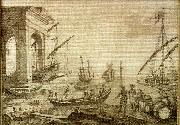 |
ulrika melin
|
|
Ulrika Drufva, född 1767, död 1834, var en svensk textilkonstnär, ledamot av Fria konsternas Akademi.
Ulrika Melin var dotter till major Lars Melin, syster till generalmajor Henrik Georg Melin och från 1788 gift med ståthållaren på Västerås slott Peter Thure Gerhard Drufva. Melin var konstnär och "egde en ovanlig skicklighet uti att sy landskap". Hon invaldes i akademin år 1784 för ett arbete i vit satin, inspirerad av Claude Lorrain. |
|
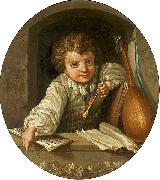 |
Ulrika Pasch
|
|
(10 July 1735 - 2 April 1796), also known as Ulla Pasch, was a Swedish painter and miniaturist. She was one of few female artists known in Scandinavia before the 19th century. She was a member of the Royal Swedish Academy of Arts (1773).
Ulrika Pasch was born in an artistic family, daughter of the painter Lorens Pasch the Elder, and sister of the future painter Lorens Pasch the Younger. Her uncle, Johan Pasch, was also a painter.
In the 1750s, when her brother was studying art abroad, her father's career declined severely, and Ulrika was forced to become a housekeeper in the home of her maternal aunt's widower. Her uncle however allowed her to spend a lot of time developing her artistic talent, and from 1756, she had become a professional portrait painter and was able to support her father and her sister in this way. After her father's death, she lived with her sister and set up her own studio.
When her brother returned to Sweden in 1766, she had been a professional artist for ten years and her clientele had moved from the middle class to the upper classes and the aristocracy. Ulrika Pasch and her brother then worked together as professional artists, shared their studio and guided each other in their work; their collaboration was one of mutual respect and harmony, and she is known to have helped him painting the textiles and costumes, a work he found tiring. Their baby-sister Helena Sofia (1744-96) took care of their household; she is described as somewhat talented in art as well, but she spent her life as her siblings "dutiful" house-keeper, and is said to have been deeply devoted to especially Ulrika. |
|
|
|
|
|
|
|
|
|
|









